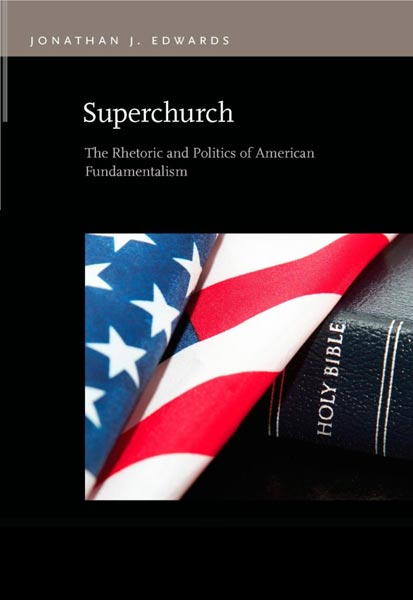 Superchurch Superchurch
The Rhetoric and Politics of American Fundamentalism
Jonathan J. Edwards
Narrated by Michael Rene Zuzel
Available from Audible
Book published by Michigan State University Press
Christian Fundamentalism is a doctrine and a discourse in tension. Fundamentalists describe themselves as both marginal and a majority. They announce the imminent end of the world while building massive megachurches and political lobbying organizations. They speak of the need for purity and separation from the outside world while continually innovating in their search for more effective and persuasive ways to communicate with and convert outsiders. To many outsiders, Fundamentalist speech seems contradictory, irrational, intolerant, and dangerously antidemocratic. To understand the complexity of Fundamentalism, we have to look inside the tensions and the paradoxes. We have to take seriously the ways in which Fundamentalists describe themselves to themselves, and to do that, we must begin by exploring the central role of “the church” in Fundamentalist rhetoric and politics. Drawing on five fascinating case studies, Superchurch blends a complex yet readable treatment of rhetorical and political theory with a sophisticated approach to Fundamentalism that neither dismisses its appeal nor glosses over its irresolvable tensions. Edwards challenges theories of rhetoric, counterpublics, deliberation, and civility while offering critical new insights into the evolution and continuing influence of one of the most significant cultural and political movements of the past century.
Jonathan J. Edwards is Instructor of Speech Communication and Rhetoric at the University of South Carolina.
REVIEWS:
“This is an insightful, balanced view of American Protestant fundamentalism based on solid case studies that ground the conclusions in fundamentalist rhetoric and community.”
—Quentin J. Schultze, Arthur H. DeKruyter Chair, Calvin College, and author of Christianity and the Mass Media in America “Edwards's book represents the best of the current scholarly approaches to contemporary religious rhetoric. This book is required reading for anyone interested in the changing nature of religious commitments in the twenty-first century.”
—Robert Glenn Howard, University of Wisconsin-Madison
|

